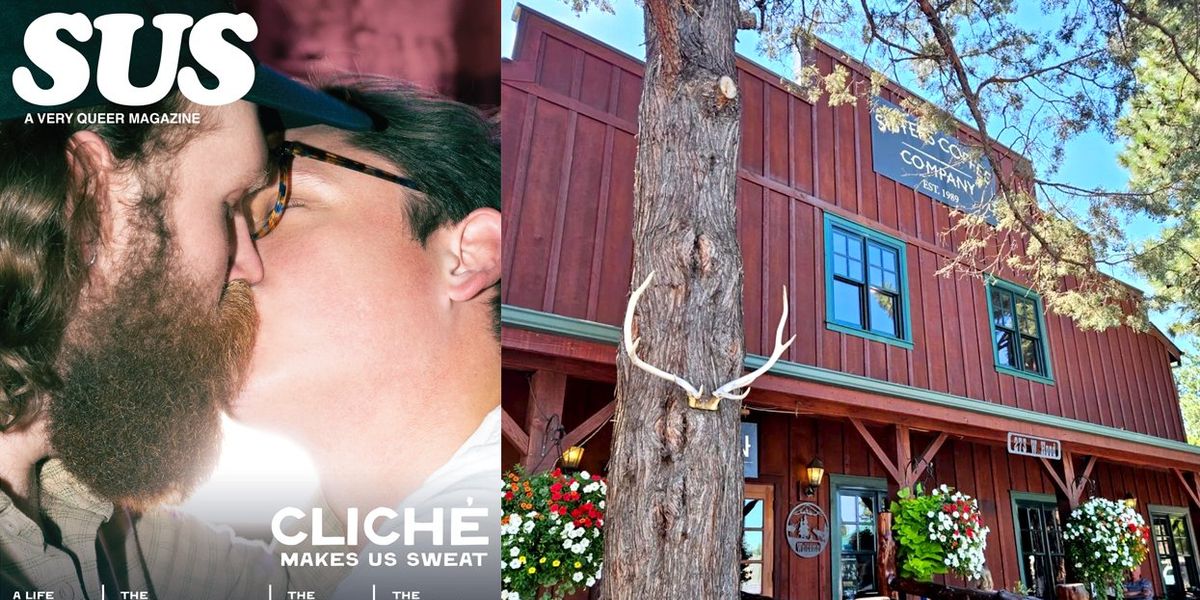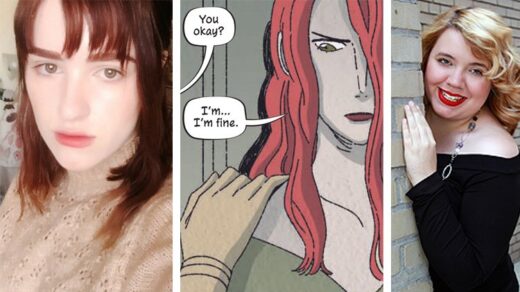A small-town cafe said it would use a queer magazine as ‘kindling.’ The community hit back
Author: Ryan Adamczeski

When Ruth Vernotico walked into Sisters Coffee Company in October, the only thing on their mind was business.
The publisher had just launched the first-ever issue of SUS Magazine – a nonprofit LGBTQ+ publication focused on the queer community in Central Oregon. Vernotico went to the local cafe in the town of Sisters, about 150 miles from Portland, hoping that the establishment would allow them to display the issue for their customers to read.
What happened later shook the local queer community, spurring outcry and prompting at least one cafe employee to quit.
When Vernotico returned to the cafe in January to drop off SUS’ latest issue, the journalist said they spoke to someone they were told was a manager, who initially agreed to put the magazine out. The problem arose when the cafe owner saw the cover of the magazine, according to Vernotico.
The issue featured Pacific-Northwest queer DJ duo, CLICHÉ, and its members, Daddy Doubtfire and Father Sean, embraced in a tender kiss – steamy, but PG. Vernotico said the owner looked at cover then approached the manager, and the two spoke in hushed voices.
“It didn’t look like it was a good conversation, just by the looks of both of their faces,” Vernotico said.
As the publisher was waiting in line to order coffee, the manager then walked back over, becoming “very close to me to the point that I was uncomfortable,” and relayed the owner’s message about the magazines in a “low whispering voice.”
“He said that he thought it would be best if I took them with me so that they weren’t used for kindling in their fireplace,” Vernotico recalled to The Advocate.
Despite the “embarrassment” that overtook Vernotico, the journalist didn’t react or “do anything dramatically” in the moment, instead opting to silently take the copies and leave. The journalist said that while it is a business’s right to determine what they display, they were shaken by the disrespect and vitriol in the response.
“I immediately felt this wash of shame kind of go over me. I just grabbed them and walked out and I sat in my car … and I cried,” they continued. “Then I cried some more when I realized that I haven’t been embarrassed like that in a really long time. I haven’t been confronted with my gender and sexuality and all of that in a very long time.”
At the urging of SUS’s board, they decided to recount the incident in a video posted to the magazine’s Instagram account.
The community’s response was overwhelming. SUS’s account was soon met with an outpouring of support from local patrons and members of the queer community, which spurred Sisters Coffee Company to respond with a post to their own Instagram account.
The post, which has since been deleted, did not recognize what happened, only that there had been an “incident” that “led to a social media post that falsely represents both the incident itself and the values we stand for.” The company claimed it does not have any bias towards the LGBTQ+ community, then emphasized its status as a “2nd generation, family owned business.”
Vernotico said the deleted post was “goofy,” and that the company was “essentially accusing me of misrepresenting the facts.” The apology was also underwhelming to many of the locals who saw it, spurring some to action.
Bevyn Dyer, a Sisters resident who identifies as queer, decided to personally reach out to Sisters Coffee Company. As family friends of the owners – Justin, Jesse, and Jared Durham – Dyer and her mother each penned a letter urging the business to reconsider their policy and to reach out to Vernotico.
“When I began reading your apology, the blatant dismissal of this person’s pain was in the first couple of lines. It reminded me of the many encounters I have had with homophobia in this town,” the letter, shared with The Advocate, reads in part. “As a queer person growing up in Sisters, I have witnessed firsthand the hate and attempts to cover that hate with pretty words. I understand that you are trying to communicate your appreciation for the queer community. The current apology, however, did not achieve what you were hoping.”
As a member of the LGBTQ+ community, Dyer also voiced concern over the word “kindling” allegedly being used in the initial exchange between Vernotico and the employee. She told The Advocate that the word “just hit me so hard because burning something is getting rid of evidence, and it’s the destroying of the entire situation.”
The anti-LGBTQ+ slur “faggot” is often associated with fire symbolism. The word, from 13th century France, means “bundle of sticks,” and was used in the 1500s phrase “fire and faggot” referring to the “punishment of a heretic” by burning them alive, according to the Online Etymology Dictionary. While the explanation that gay men are now called “faggots” because they were burned at the stake is an urban legend, the historic roots of the imagery invoked are felt deeply within the queer community.
“The word, ‘kindling,’ and the use of fire to destroy has deeper hateful connotations than maybe you intended,” Dyer’s letter continued. “I believe that action is needed to show that you would never condone something of the sort.”
Dyer and her mother hand-delivered their letters to cafe owner Justin Durham, who she said seemed receptive when he later read them. Her message called on Sisters Coffee to display SUS in its cafe “somewhere visible and far away from the fireplace.” Dyer said she also encouraged Durham to put stickers signifying “all are welcome” in their doors to demonstrate acceptance to the LGBTQ+ people who felt alienated by the incident.
Dyer said her suggestions to display the magazine and welcoming symbols were both rejected outright.
“He said that there is no way to do that because of their policy,” Dyer told The Advocate, continuing, “He said he could not do that because he didn’t want to get into, like, a sticker war of having a bunch of stickers put up. Which I thought was not a very good reason.”
Dyer said “it’s not that I really expected them to put the magazine somewhere,” but rather that “the reasoning behind [it] really rubbed me the wrong way.”
“That town is my whole heart. I love it so much, and it’s my home,” she continued. “The fact that so many people’s homes are being honestly taken away from them because they don’t feel safe or comfortable being somewhere is so heartbreaking. … I just felt like something had to be said because of all of us who love that place and who love to feel safe.”
Keep up with the latest in LGBTQ+ news and politics. Sign up for The Advocate’s email newsletter.
A spokesperson for Sisters Coffee Company said that the rejection of the magazine was not based on its LGBTQ+ content, but rather that it is company policy to “only display two local newspapers in our Sisters store in order to minimize the amount of materials our staff have to manage.”
“The recent communication of this policy to a member of our community fell short of exemplifying our company values of kindness, dignity and integrity,” the company told The Advocate via email. “We regret any harm this response caused and apologize to all who were impacted. We wholeheartedly support our staff and our fellow community members who identify as LGBTQ+ and our stores remain a place where all are welcome.”
Sisters Coffee Company also said that “any potential verbal permission that might have been given to SUS to display their magazine would have been provided by an employee who did not have the authority to do so, and without our knowledge.”
Still, the company added that “as we move forward, we are evaluating our internal processes and communications to ensure all of our staff feel safe and supported. We are also considering what actions we can take to authentically show our support for the LGBTQ+ community here in Central Oregon as we learn and grow from this experience.”
Vernotico said that they took issue with the fact that the apology was not directed at them specifically. They also said they felt overlooked by how other members of the community, such as Dyer, have spoken with the owners of Sisters Coffee Company about the incident, but they still have not been able to reach them.
“All of those folks all got invited to have a conversation with the ownership,” Vernotico said. “I’ve never had that.”
The journalist also refuted the notion that the rejection of SUS was not based on anti-LGBTQ+ bias, as they recalled the decision was made upon seeing its cover.
“I got approval for something, and then upon further inspection and realizing what it was, I was told no,” they said. “That was a direct judgment of what the magazine is, and queerness in general.”
When The Advocate asked follow-up questions about what steps the company would take to show LGBTQ+ support, and whether or not the owners have reached out to Vernotico, Sisters Coffee did not respond.
Sisters Coffee’s response also didn’t sit well with Maya Zavala, a former employee of the company who is queer, and who quit after the incident involving SUS. Zavala worked at the company’s location in Bend for over a year and a half, stating that general culture was “welcoming” in words, but “laced with micro to macro aggressions.”
“I was consistently misgendered all the time, even by my manager or other shift leads that know that I use they/them pronouns,” they told The Advocate. “I talked with my manager about that … but I just kind of gave up on feeling comfortable in that space.”
After Zavala saw Vernotico’s initial video, they heavily considered whether or not to quit. It was the subsequent response from Sisters Coffee, and the other LGBTQ+ people speaking out, that motivated them to leave.
Zavala said that the company did not recognize the incident outside of re-sending their first “apology” posted online to their employees “without further explanation.” When they went to work, “it was as if it hadn’t happened.”
“We weren’t told how to talk about it if customers asked about it, which they did. There were no conversations,” they said.
Zavala said Vernotico’s story helped them to feel “empowered by knowing that I wasn’t alone.” They then put in their two-week notice.
“I have enjoyed working here. I was like, ‘I don’t want to quit my job.’ I didn’t foresee that financially for me, either,” Zavala said. “But it felt like a disservice to like myself and our community if I was still a part of it.”
At the end of the day, Vernotico said that they are “not trying to be a martyr in all of this,” and that they are “not trying to cancel” Sisters Coffee either. The journalist said that they simply want to encourage people to “vote with your dollar,” and to “stop the influx of queer money into a business that doesn’t support us.” More importantly, they wanted Sisters Coffee Company to reflect on the incident, and the motivations behind their decisions.
“My goal was that they would see my video and that they would say, ‘You know what, we’ve been going about this wrong. We need to do some work and then hire people or get a consultant,’ or do whatever they needed to do to fix the problem, and reach out to me to assure me that those things are happening,” Vernotico said. “None of that happened.”
From Your Site Articles
Original Article on The Advocate
Author: Ryan Adamczeski




